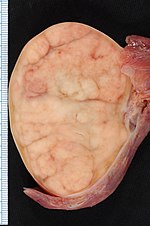Difference between revisions of "Orchiectomy grossing"
Jump to navigation
Jump to search

| Line 13: | Line 13: | ||
**Do not cut through. | **Do not cut through. | ||
**If tumour is a large do additional cuts parallel to the first cut to ensure proper [[fixation]]. | **If tumour is a large do additional cuts parallel to the first cut to ensure proper [[fixation]]. | ||
*Place specimen(s) in [[formalin]]. | |||
Note: | Note: | ||
Revision as of 01:28, 7 May 2015

Orchiectomy specimen showing testis replaced by tumour (proven to be seminoma). (WC/Ed Uthman)
This article deals with orchiectomy grossing.
Introduction
Orchiectomies are typically done for testicular tumours.
They may be done for chronic pain[1] or to control prostate cancer.
Specimen opening
- Orient the specimen.
- Follow cord to hilum of testis and epididymis.
- Bisect the testis with one cut toward the hilum.
- Do not cut through.
- If tumour is a large do additional cuts parallel to the first cut to ensure proper fixation.
- Place specimen(s) in formalin.
Note:
- Cutting easier if blade wet before cutting.
Protocol
Dimensions and weight:
- Laterality: [ left / right ].
- Weight: ___ grams.
- Testis: ___ x ___ x ___ cm.
- Epididymis: ___ x ___ x ___ cm.
- Spermatic cord - length: __ cm, diameter: ___ cm.
- Inking: [colour].
Tumour:
- Size: ___ x ___ x ___ cm.
- Colour: [ tan / white / variable ].
- Firmness: [ firm / soft ].
- Morphology: [solid / cystic / solid and cystic - with ___ % cystic].
- Circumscription: [circumscribed / infiltrative border ].
- Hemorrhage: [ absent / present ].
- Necrosis: [ absent / present ].
- Extension into tunica albuginea: [ not identified / indeterminate / present ].
- Extension into the epididymis: [ not identified / indeterminate / present ].
Other - after sectioning:
- Testicular parenchyma: [ brown-tan, unremarkable / ___ ].
- Spermatic cord: [ unremarkable / ___ ].
Representative sections are submitted as follow:
- Spermatic cord resection margin, en face.
- Spermatic cord mid-section, cross section.
- Spermatic cord close to testis.
- Tumour in relation to epididymis.
- Tumour and rete testis.
- Tumour with testicular coverings.
- Additional tumour sections.
- Testis distant from the tumour.
Protocol notes
- The tumour should be submitted in total if this can be done in less than 10 cassettes.
- Lester's book (2nd Ed.) recommends 1 cassette per cm of maximal tumour dimension.[2]
Staging
Based on AJCC 7th Edition:[3][4]
- pT1 - confined to the testis or epididymis, no lymphovascular invasion.
- pT2 - into tunica vaginalis or lymphovascular invasion.
- pT3 - into spermatic cord.
- pT4 - into the scrotum.
Notes:
- Invasion into the epididymis and/or tunica albuginea does not change the stage.[4]
- Rete testis involvement and testicular hilum involvement may be seen or suspected at the time of cut-up. Both of these are poor prognosticators;[5] however, they to do not affect the (AJCC 7th Edition) stage.
- Involvement of the testicular hilum is not specifically addressed in the AJCC 7th Edition. Based on the current evidence, tt is probably best classified as pT1 (if there is no LVI and the tumour is otherwise confined to the testis/epididymis).
Alternate approaches
See also
Related protocols
References
- ↑ Rönkä, K.; Vironen, J.; Kokki, H.; Liukkonen, T.; Paajanen, H. (Feb 2015). "Role of orchiectomy in severe testicular pain after inguinal hernia surgery: audit of the Finnish Patient Insurance Centre.". Hernia 19 (1): 53-9. doi:10.1007/s10029-013-1150-3. PMID 23929499.
- ↑ Lester, Susan Carole (2005). Manual of Surgical Pathology (2nd ed.). Saunders. pp. 409. ISBN 978-0443066450.
- ↑ URL: https://en.wikibooks.org/wiki/Radiation_Oncology/Testis/Staging. Accessed on: 15 December 2014.
- ↑ 4.0 4.1 URL: http://www.cancer.org/cancer/testicularcancer/detailedguide/testicular-cancer-staging. Accessed on: 15 December 2014.
- ↑ Yilmaz, A.; Cheng, T.; Zhang, J.; Trpkov, K. (Apr 2013). "Testicular hilum and vascular invasion predict advanced clinical stage in nonseminomatous germ cell tumors.". Mod Pathol 26 (4): 579-86. doi:10.1038/modpathol.2012.189. PMID 23238629.